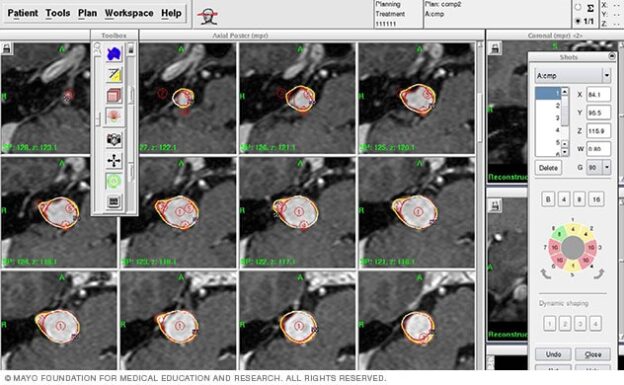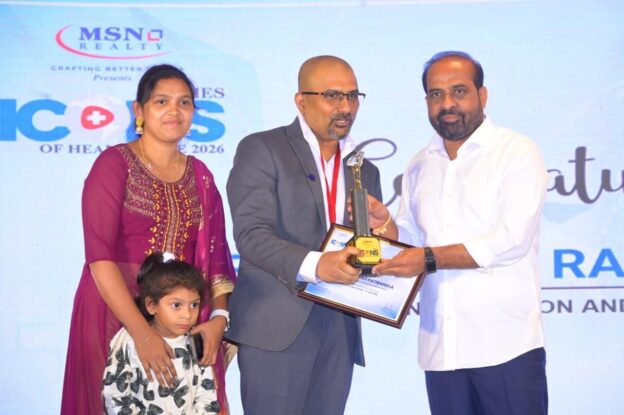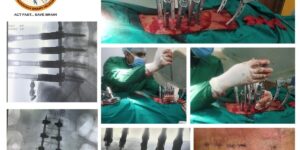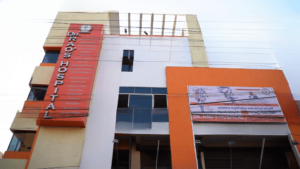Who Is Not a Candidate for Radiosurgery? A Neurosurgeon Explains Honestly
Radiosurgery—often known as Gamma Knife, CyberKnife, LINAC, or stereotactic radiosurgery (SRS)—is widely promoted as a “one-day, no-cut” treatment for brain tumors and other neurological conditions. While it is an excellent option for many patients, it is not suitable for everyone.
One of the most important responsibilities of an experienced neurosurgeon is knowing when not to recommend radiosurgery. Honest selection protects patients from ineffective treatment, unexpected complications, and loss of precious time.
This comprehensive guide explains clearly who is not a candidate for radiosurgery, why certain patients are ineligible, and what safer or more effective alternatives may be considered instead.
What Is Radiosurgery—and Why Selection Matters
Radiosurgery is a highly focused form of radiation therapy that delivers a precise, high dose of radiation to a defined target while sparing surrounding normal brain tissue.
It works best when:
- The target is small and well defined
- The surrounding brain can be safely protected
- The patient’s overall health allows benefit from treatment
When these conditions are not met, radiosurgery may be ineffective or even harmful.
Large Brain Tumors: Size Matters in Radiosurgery
One of the most common reasons a patient is not a candidate for radiosurgery is tumor size.
In general:
- Brain tumors larger than 3–3.5 cm are usually not suitable
- Metastatic tumor volume greater than 14 cc is high risk
Large tumors require higher radiation doses to control, which significantly increases the risk of:
- Brain swelling (edema)
- Radiation necrosis
- Worsening neurological deficits
In such cases, surgery or fractionated radiotherapy is often safer.
Too Many Brain Metastases
Radiosurgery is commonly used for brain metastases, but there are limits.
Patients may be ineligible for SRS when:
- There are more than 10–15 brain metastases
- Total tumor volume is excessive
- Lesions are spread diffusely across the brain
Although modern practice allows treatment of multiple metastases, extensive disease may benefit more from:
- Whole brain radiotherapy (WBRT)
- Systemic therapy combined with supportive care
Significant Mass Effect or Brain Shift
Radiosurgery does not provide immediate relief. Tumor shrinkage occurs gradually over weeks to months.
Patients are not suitable for radiosurgery if they have:
- Severe brain compression
- Midline shift
- Signs of raised intracranial pressure
These patients often need urgent surgical decompression before any radiation treatment is considered.
Leptomeningeal Disease
Leptomeningeal spread involves cancer cells coating the brain and spinal cord surfaces.
Radiosurgery targets focal lesions. It is not effective for diffuse conditions like:
- Leptomeningeal metastases
- Diffuse meningeal tumors
These patients require systemic therapy or craniospinal irradiation instead.
Tumors Too Close to Critical Brain Structures
Some tumors are located dangerously close to vital structures.
Radiosurgery may be unsuitable when lesions are:
- Abutting the optic nerves or optic chiasm
- Within or very close to the brainstem
- Near critical cranial nerves controlling vision or swallowing
In these locations, even small radiation doses can cause permanent neurological damage.
Fractionated radiotherapy or surgery may be safer.
Poor Performance Status or Limited Life Expectancy
Radiosurgery is most beneficial when patients are well enough to live long enough to experience tumor control.
Patients may not be candidates if they have:
- ECOG performance status > 2
- Severe neurological disability
- Very advanced systemic cancer
In such cases, supportive or palliative care may provide better quality of life.
Uncontrolled Systemic Disease
When cancer outside the brain is rapidly progressing, treating the brain alone may not change overall outcomes.
Radiosurgery may not be appropriate if:
- Primary cancer is uncontrolled
- Multiple organs are failing
- Expected survival is very limited
Treatment focus should shift toward comfort and symptom control.
Radiosurgery Is Not Suitable for All AVMs
While radiosurgery can treat some arteriovenous malformations (AVMs),
it is not suitable when:
- AVM size is very large
- There is prior hemorrhage with mass effect
- AVM anatomy is complex
Microsurgery or endovascular treatment may be preferred.
Special Situations Where Radiosurgery Is Limited
- Pregnancy: Radiation exposure risk to fetus
- Children: Long-term radiation effects on developing brain
- MRI incompatibility: Pacemakers or implants
- Inability to tolerate immobilization frame
What Are the Alternatives When Radiosurgery Is Not an Option?
When radiosurgery is unsuitable, effective alternatives include:
- Microsurgical tumor removal
- Fractionated external beam radiotherapy
- Targeted systemic therapies
- Palliative and supportive care
The right choice depends on tumor type, location, and patient goals.
Learn more at Dr. Rao’s Hospital, our Neurosurgery Department, Neurology Services, or Contact Us.
Who is not a candidate for radiosurgery?
Patients with large tumors, extensive brain metastases, severe brain compression, or poor overall health may not be suitable for radiosurgery.
Is radiosurgery safe for all brain tumors?
No. Radiosurgery is safe only for carefully selected patients based on size, location, and overall condition.
Why choose Dr. Rao’s Hospital for radiosurgery evaluation?
At Dr. Rao’s Hospital, led by Dr. Mohana Rao Patibandla, patients receive honest, evidence-based guidance on whether radiosurgery is appropriate—or not.
Considering Radiosurgery? Get an Honest Expert Opinion
Not every patient benefits from radiosurgery—and that honesty saves lives. For clear, ethical guidance on brain tumor treatment options, consult Dr. Rao’s Hospital, led by Dr. Mohana Rao Patibandla,
📞 Call: 090100 56444
📧 Email: info@drraoshospitals.com
🌐 Website: https://drraoshospitals.com
Follow Dr. Rao’s Hospital:
Facebook |
Instagram |
YouTube |
LinkedIn |
X (Twitter)
Why “Not a Candidate” Can Be the Safest Medical Advice
For many patients and families, hearing that someone is not a candidate for radiosurgery can be disappointing or confusing—especially after reading promotional content online. However, in real clinical practice, this statement often reflects responsible, ethical, patient-first decision-making.
Radiosurgery is a powerful tool, but it is not a universal solution. When used outside its ideal indications, it may:
- Fail to control the disease
- Delay more effective treatment
- Increase the risk of neurological complications
A good neurosurgeon does not ask, “Can radiosurgery be done?” but rather, “Should radiosurgery be done for this patient?”
The Importance of a Multidisciplinary Evaluation
Determining radiosurgery eligibility is rarely a single-doctor decision. The best outcomes come from a multidisciplinary tumor board approach, involving:
- Neurosurgeons
- Radiation oncologists
- Medical oncologists
- Neuroradiologists
This team-based evaluation ensures that tumor size, location, biology, patient fitness, and long-term goals are all considered—rather than focusing on one technology alone.
When a Second Opinion Is Especially Valuable
Patients should strongly consider a second opinion if:
- Radiosurgery is recommended despite a large tumor or severe symptoms
- There is pressure to “rush” into treatment without discussion of alternatives
- Different doctors give conflicting advice
- You are told “radiosurgery is the only option” without explanation
An experienced center will clearly explain why radiosurgery is appropriate—or why it is not,
using imaging, data, and transparent reasoning.
What Patients Should Ask Before Accepting or Rejecting Radiosurgery
- What is the exact size and volume of my tumor?
- Is there mass effect or brain swelling?
- How close is the tumor to critical structures?
- What happens if radiosurgery does not work?
- What are the alternative treatments and their outcomes?
Clear answers to these questions help patients make confident, informed decisions.
Radiosurgery Is a Tool—Not a Treatment Philosophy
The most important message for patients is this: Good care is not defined by offering radiosurgery to everyone.
It is defined by choosing the right treatment, for the right patient, at the right time.
Sometimes that treatment is radiosurgery. Sometimes it is surgery, fractionated radiotherapy, systemic therapy, or supportive care.
Honest exclusion is often the first step toward better outcomes.
Unsure If Radiosurgery Is Right for You?
If you or your family member has been advised radiosurgery—or told you are not eligible—
getting a clear, unbiased expert opinion is essential.
At Dr. Rao’s Hospital, Guntur, each patient undergoes careful evaluation to determine who will truly benefit from radiosurgery—and who will not, with complete transparency and compassion.
📞 Call: 090100 56444
📧 Email: info@drraoshospitals.com
🌐 Website: https://drraoshospitals.com
Explore Related Brain Tumor & Radiosurgery Services:
🧠 Radiosurgery (Gamma Knife / SRS) |
🧠 Brain Tumor Evaluation & Treatment |
🧠 Neurosurgery Department |
🧬 Neurology & Neuro-Oncology |
📞 Book an Appointment
Connect With Dr. Rao’s Hospital:
📘 Facebook |
📸 Instagram |
📺 YouTube |
💼 LinkedIn |
🐦 X (Twitter) |
📍 Google Maps
Dr. Rao’s Hospital, Guntur
Honest Neurosurgery • Ethical Radiosurgery • Patient-First Decisions
రేడియోసర్జరీకి ఎవరు అర్హులు కారు? – నిజాయితీగా న్యూరోసర్జన్ వివరణ
రేడియోసర్జరీ (Radiosurgery) అనే మాట విన్నప్పుడు చాలా మందికి ఇది “ఒకే రోజు, కట్ లేకుండా జరిగే సురక్షిత చికిత్స” అనే భావన కలుగుతుంది. Gamma Knife, CyberKnife లేదా Stereotactic Radiosurgery (SRS) వంటి చికిత్సలు నిజంగానే చాలా మంది రోగులకు అద్భుతమైన ఫలితాలు ఇస్తాయి.
కానీ ఒక ముఖ్యమైన నిజం ఏమిటంటే — రేడియోసర్జరీ అందరికీ సరిపోదు. కొన్ని పరిస్థితుల్లో ఈ చికిత్స చేయడం ఫలితం ఇవ్వకపోవచ్చు లేదా ప్రమాదకరమై ఉండవచ్చు.
నిజాయితీగల న్యూరోసర్జన్ బాధ్యత ఏమిటంటే ఎప్పుడు రేడియోసర్జరీ చేయాలో మాత్రమే కాదు, ఎప్పుడు చేయకూడదో కూడా స్పష్టంగా చెప్పడం. ఈ బ్లాగ్లో రేడియోసర్జరీకి ఎవరు అర్హులు కారు,
ఎందుకు కారు, మరియు ప్రత్యామ్నాయాలు ఏమిటో సులభమైన భాషలో తెలుసుకుందాం.
రేడియోసర్జరీ అంటే ఏమిటి? ఎందుకు సరైన ఎంపిక ముఖ్యం?
రేడియోసర్జరీ అనేది చాలా ఖచ్చితంగా (high precision) రేడియేషన్ను మెదడులోని ఒక నిర్దిష్ట ప్రాంతానికి పంపించే చికిత్స.
ఇది బాగా పనిచేసే పరిస్థితులు:
- ట్యూమర్ చిన్నగా, స్పష్టంగా ఉన్నప్పుడు
- చుట్టూ ఉన్న మెదడు భాగాలకు నష్టం తక్కువగా ఉండేలా ప్లాన్ చేయగలిగితే
- రోగి ఆరోగ్యం బాగుండి చికిత్స ఫలితం పొందే అవకాశం ఉన్నప్పుడు
ఈ ప్రమాణాలు సరిపోకపోతే రేడియోసర్జరీ సరైన చికిత్స కాదు.
పెద్ద బ్రెయిన్ ట్యూమర్లు – రేడియోసర్జరీకి ప్రధాన పరిమితి
రేడియోసర్జరీకి అర్హులు కాకపోవడానికి అత్యంత సాధారణ కారణం ట్యూమర్ పరిమాణం.
సాధారణంగా:
- 3–3.5 సెం.మీ కంటే పెద్ద బ్రెయిన్ ట్యూమర్లు
- 14 cc కంటే ఎక్కువ వాల్యూమ్ ఉన్న మెటాస్టాసిస్
ఇలాంటి ట్యూమర్లకు అధిక రేడియేషన్ అవసరం అవుతుంది.
దీని వల్ల:
- మెదడులో వాపు (Brain edema)
- రేడియేషన్ నెక్రోసిస్
- న్యూరాలజికల్ సమస్యలు
ఈ పరిస్థితుల్లో సర్జరీ లేదా ఫ్రాక్షనేటెడ్ రేడియోథెరపీ ఎక్కువ సురక్షితం.
చాలా ఎక్కువ బ్రెయిన్ మెటాస్టాసిస్ ఉన్నప్పుడు
బ్రెయిన్ మెటాస్టాసిస్ చికిత్సలో రేడియోసర్జరీ చాలా ఉపయోగకరమైనది. కానీ పరిమితులు ఉన్నాయి.
క్రింది పరిస్థితుల్లో రేడియోసర్జరీ సరిపోదు:
- 10–15 కంటే ఎక్కువ బ్రెయిన్ మెటాస్టాసిస్
- మొత్తం ట్యూమర్ వాల్యూమ్ చాలా ఎక్కువగా ఉన్నప్పుడు
- మెదడు మొత్తం వ్యాప్తి చెందిన ట్యూమర్లు
ఇలాంటి సందర్భాల్లో:
- Whole Brain Radiotherapy (WBRT)
- సిస్టమిక్ క్యాన్సర్ చికిత్స
ఎక్కువ ప్రయోజనం ఇవ్వవచ్చు.
తీవ్రమైన మెదడు ఒత్తిడి (Mass Effect) ఉన్న రోగులు
రేడియోసర్జరీ వెంటనే ఫలితం ఇవ్వదు. ట్యూమర్ తగ్గడానికి వారాలు లేదా నెలలు పడుతుంది.
కానీ క్రింది లక్షణాలు ఉన్న రోగులకు వెంటనే ఉపశమనం అవసరం:
- మెదడుపై తీవ్రమైన ఒత్తిడి
- Midline shift
- తీవ్రమైన తలనొప్పి, వాంతులు
ఇలాంటి సందర్భాల్లో ముందుగా సర్జరీ చేసి ఒత్తిడి తగ్గించాలి. రేడియోసర్జరీ తర్వాత ఆలోచించవచ్చు.
లెప్టోమెనింజియల్ డిసీజ్ ఉన్నవారు
లెప్టోమెనింజియల్ డిసీజ్ అంటే క్యాన్సర్ కణాలు మెదడు మరియు స్పైనల్ కార్డ్ ఉపరితలంపై
వ్యాప్తి చెందడం.
రేడియోసర్జరీ ఒకే చోట ఉన్న ట్యూమర్కు మాత్రమే పనిచేస్తుంది.
అందుకే:
- లెప్టోమెనింజియల్ మెటాస్టాసిస్
- డిఫ్యూస్ మెనింజియల్ వ్యాధులు
రేడియోసర్జరీకి అర్హులు కావు.
ముఖ్యమైన నరాలకు చాలా దగ్గరగా ఉన్న ట్యూమర్లు
కొన్ని ట్యూమర్లు చాలా కీలకమైన ప్రాంతాలకు దగ్గరగా ఉంటాయి:
- ఆప్టిక్ నర్వ్ / ఆప్టిక్ కియాసమ్ (చూపు నరాలు)
- బ్రెయిన్ స్టెమ్
- క్రానియల్ నర్వ్స్
ఇలాంటి చోట్ల చిన్న రేడియేషన్ కూడా శాశ్వత నష్టం కలిగించవచ్చు.
అందుకే ఇక్కడ ఫ్రాక్షనేటెడ్ రేడియోథెరపీ లేదా సర్జరీ సురక్షితం.
ఆరోగ్య స్థితి బలహీనంగా ఉన్న రోగులు
రేడియోసర్జరీ ఫలితం పొందాలంటే రోగి ఆరోగ్య స్థితి కూడా ముఖ్యం.
క్రింది పరిస్థితుల్లో రేడియోసర్జరీ ప్రయోజనం తక్కువ:
- ECOG > 2
- తీవ్రమైన న్యూరాలజికల్ డిసేబిలిటీ
- చాలా అడ్వాన్స్డ్ క్యాన్సర్
ఇలాంటి సందర్భాల్లో పాలియేటివ్ కేర్ జీవిత నాణ్యత మెరుగుపరుస్తుంది.
ఇతర ప్రత్యేక పరిస్థితులు
- గర్భధారణ – శిశువుకు రేడియేషన్ ప్రమాదం
- చిన్న పిల్లలు – దీర్ఘకాల ప్రభావాలు
- MRI చేయలేని పరికరాలు (పేస్మేకర్)
- రేడియోసర్జరీ ఫ్రేమ్ భరించలేని రోగులు
రేడియోసర్జరీ సరిపోకపోతే ప్రత్యామ్నాయాలు ఏమిటి?
- మైక్రోసర్జికల్ బ్రెయిన్ ట్యూమర్ సర్జరీ
- ఫ్రాక్షనేటెడ్ రేడియోథెరపీ
- టార్గెటెడ్ లేదా ఇమ్యునోథెరపీ
- పాలియేటివ్ & సపోర్టివ్ కేర్
సరైన చికిత్స ట్యూమర్ రకం, స్థానం, మరియు రోగి లక్ష్యాలపై ఆధారపడి ఉంటుంది.
నిజాయితీగల “లేదు” కూడా చికిత్సలో భాగమే
రేడియోసర్జరీ చేయకపోవడం అంటే చికిత్స చేయకపోవడం కాదు.
అది సరైన సమయంలో సరైన చికిత్స వైపు రోగిని నడిపించే బాధ్యతాయుత నిర్ణయం.
రేడియోసర్జరీ మీకు సరిపోతుందా? స్పష్టత కావాలా?
మీరు లేదా మీ కుటుంబ సభ్యులు రేడియోసర్జరీ గురించి ఆలోచిస్తున్నట్లయితే, లేదా “అర్హులు కాదు” అని చెప్పినట్లయితే, నిజాయితీగల రెండవ అభిప్రాయం అవసరం.
Dr. Rao’s Hospital, led by Dr. Mohana Rao Patibandla, లో ప్రతి రోగికి రేడియోసర్జరీ సరిపోతుందా లేదా స్పష్టంగా, నైతికంగా అంచనా వేస్తాం.
📞 ఫోన్: 090100 56444
📧 ఈమెయిల్: info@drraoshospitals.com
🌐 వెబ్సైట్: https://drraoshospitals.com
ముఖ్యమైన సేవలు:
🧠 రేడియోసర్జరీ (Gamma Knife / SRS) |
🧠 బ్రెయిన్ ట్యూమర్ చికిత్స |
🧠 న్యూరోసర్జరీ విభాగం |
🧬 న్యూరాలజీ సేవలు |
📞 అపాయింట్మెంట్ బుక్ చేయండి
సోషల్ మీడియాలో మమ్మల్ని ఫాలో అవ్వండి:
📘 Facebook |
📸 Instagram |
📺 YouTube |
💼 LinkedIn |
🐦 X (Twitter)
Dr. Rao’s Hospital, గుంటూరు
నిజాయితీ • నమ్మకం • ఆధునిక బ్రెయిన్ కేర్
రేడియోసర్జరీ గురించి రోగులు ఎక్కువగా అడిగే ప్రశ్నలు (PAA)
రేడియోసర్జరీ (Gamma Knife / SRS) గురించి గూగుల్లో రోగులు మరియు కుటుంబ సభ్యులు ఎక్కువగా అడిగే ప్రశ్నలు ఇవే. ఈ PAA (People Also Ask) బ్లాగ్లో ప్రతి ప్రశ్నకు న్యూరోసర్జన్ దృష్టితో సూటిగా, నిజాయితీగా సమాధానాలు ఇస్తున్నాం.
రేడియోసర్జరీ అంటే ఏమిటి?
రేడియోసర్జరీ అనేది శస్త్రచికిత్స (కట్) చేయకుండా, అత్యంత ఖచ్చితంగా రేడియేషన్ను ఒక చిన్న ప్రాంతానికి పంపే చికిత్స.
ఇది ముఖ్యంగా:
- చిన్న బ్రెయిన్ ట్యూమర్లు
- కొన్ని బ్రెయిన్ మెటాస్టాసిస్
- AVM, ట్రైజెమినల్ న్యూరాల్జియా
వంటి పరిస్థితుల్లో ఉపయోగపడుతుంది.
రేడియోసర్జరీ అందరికీ సరిపోతుందా?
కాదు. రేడియోసర్జరీ అందరికీ సరిపోదు.
ఇది ఒక ప్రత్యేక చికిత్స. సరైన రోగిని ఎంచుకోకపోతే ఫలితం ఉండకపోవచ్చు లేదా ప్రమాదం ఉండవచ్చు.
ఎలాంటి రోగులు రేడియోసర్జరీకి అర్హులు కారు?
క్రింది పరిస్థితుల్లో రేడియోసర్జరీ సాధారణంగా సిఫార్సు చేయరు:
- 3–3.5 సెం.మీ కంటే పెద్ద బ్రెయిన్ ట్యూమర్లు
- 14 cc కంటే ఎక్కువ వాల్యూమ్ ఉన్న ట్యూమర్లు
- 10–15 కంటే ఎక్కువ బ్రెయిన్ మెటాస్టాసిస్
- మెదడుపై తీవ్రమైన ఒత్తిడి (mass effect)
పెద్ద బ్రెయిన్ ట్యూమర్లకు రేడియోసర్జరీ ఎందుకు సరిపోదు?
పెద్ద ట్యూమర్లకు ఎక్కువ రేడియేషన్ అవసరం అవుతుంది.
దీని వల్ల:
- మెదడు వాపు (brain edema)
- రేడియేషన్ నెక్రోసిస్
- న్యూరాలజికల్ సమస్యలు
ప్రమాదం ఎక్కువగా ఉంటుంది. అందుకే సర్జరీ లేదా ఫ్రాక్షనేటెడ్ రేడియోథెరపీ మంచిది.
చాలా ఎక్కువ బ్రెయిన్ మెటాస్టాసిస్ ఉంటే రేడియోసర్జరీ చేయరా?
చాలా సందర్భాల్లో చేయరు.
ఎందుకంటే:
- మెదడు మొత్తం వ్యాప్తి అయ్యే ప్రమాదం
- ప్రతి ట్యూమర్కు సురక్షిత డోస్ ఇవ్వడం కష్టం
ఇలాంటి రోగులకు Whole Brain Radiotherapy (WBRT) లేదా ఇతర చికిత్సలు సరిపోతాయి.
మెదడుపై తీవ్రమైన ఒత్తిడి ఉన్నప్పుడు ఎందుకు రేడియోసర్జరీ చేయరు?
రేడియోసర్జరీ వెంటనే పనిచేయదు. ట్యూమర్ తగ్గడానికి కొన్ని వారాలు లేదా నెలలు పడుతుంది.
కానీ:
- తీవ్రమైన తలనొప్పి
- వాంతులు
- స్పృహ తగ్గడం
ఉన్న రోగులకు వెంటనే ఉపశమనం అవసరం. అందుకే ముందుగా సర్జరీ చేస్తారు.
లెప్టోమెనింజియల్ డిసీజ్ ఉన్నవారు రేడియోసర్జరీ చేయించుకోవచ్చా?
లేదు.
లెప్టోమెనింజియల్ డిసీజ్ అంటే క్యాన్సర్ కణాలు మెదడు ఉపరితలం అంతా వ్యాప్తి కావడం.
రేడియోసర్జరీ ఒకే చోట ఉన్న ట్యూమర్కు మాత్రమే పనిచేస్తుంది.
చూపు నరాలకు దగ్గరగా ఉన్న ట్యూమర్లకు రేడియోసర్జరీ సురక్షితమా?
చాలా జాగ్రత్త అవసరం.
ఆప్టిక్ నర్వ్ లేదా బ్రెయిన్ స్టెమ్కు చాలా దగ్గరగా ఉంటే:
- చూపు శాశ్వతంగా దెబ్బతినే ప్రమాదం
- ఇతర నరాల నష్టం
ఉంటుంది. అందుకే రేడియోసర్జరీ తరచూ నివారిస్తారు.
ఆరోగ్య స్థితి బలహీనంగా ఉన్న రోగులకు రేడియోసర్జరీ చేస్తారా?
సాధారణంగా కాదు.
క్రింది పరిస్థితుల్లో ప్రయోజనం తక్కువ:
- ECOG > 2
- తీవ్రమైన న్యూరాలజికల్ డిసేబిలిటీ
- చాలా అడ్వాన్స్డ్ క్యాన్సర్
ఇలాంటి సందర్భాల్లో జీవిత నాణ్యత ముఖ్యం.
గర్భిణీలు లేదా పిల్లలకు రేడియోసర్జరీ చేస్తారా?
సాధారణంగా చేయరు.
- గర్భధారణలో శిశువుకు రేడియేషన్ ప్రమాదం
- పిల్లల్లో దీర్ఘకాల ప్రభావాలు
ఉండే అవకాశం ఉంటుంది.
రేడియోసర్జరీ సరిపోకపోతే ఏమి చేస్తారు?
ప్రత్యామ్నాయాలు ఉన్నాయి:
- బ్రెయిన్ ట్యూమర్ సర్జరీ
- ఫ్రాక్షనేటెడ్ రేడియోథెరపీ
- సిస్టమిక్ క్యాన్సర్ చికిత్స
- పాలియేటివ్ కేర్
ప్రతి రోగికి వేర్వేరు చికిత్స సరిపోతుంది.
రేడియోసర్జరీకి “లేదు” అనడం ఎందుకు ముఖ్యమైనది?
“లేదు” అనడం చికిత్స చేయడం లేదని కాదు.
అది:
- రోగిని ప్రమాదం నుంచి కాపాడడం
- సరైన చికిత్స వైపు నడిపించడం
అనే అర్థం.
గుంటూరులో రేడియోసర్జరీ అంచనా ఎక్కడ చేయించుకోవాలి?
ఇప్పుడు మెట్రో నగరాలకు వెళ్లాల్సిన అవసరం లేదు. Dr. Rao’s Hospital, లో రేడియోసర్జరీ అర్హతపై స్పష్టమైన, నైతిక అంచనా చేస్తారు. ఈ సేవలు Dr. Mohana Rao Patibandla, నేతృత్వంలో అందుబాటులో ఉన్నాయి.
రేడియోసర్జరీ మీకు సరిపోతుందా? నిజమైన సమాధానం కావాలా?
అన్ని చికిత్సలు అందరికీ సరిపోవు. సరైన చికిత్స ఎంచుకోవడమే సురక్షిత ఫలితానికి మార్గం.
📞 ఫోన్: 090100 56444
📧 ఈమెయిల్: info@drraoshospitals.com
🌐 వెబ్సైట్: https://drraoshospitals.com
Dr. Rao’s Hospital, గుంటూరు
నిజాయితీ • నమ్మకం • ఆధునిక బ్రెయిన్ ట్యూమర్ కేర్











